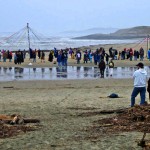In my previous article, I introduced my strategy for living in tune with the Elements. I want to examine each of the elements in more detail. Today we will begin with Earth.
Background Theory
Compared to Air and Water, Earth is more abstract. We can breathe air, and we can drink water. But short of eating dirt (which is another topic in itself), taking Earth into our bodies is not as conceptually simple, due to mammalian physiology. If we were plants, it would be easier to see, because plants have roots that extract nutrients directly from the soil. Rather than roots in the soil, we mammals have intestinal villi that extend into our alimentary canal, extracting nutrients from the food we eat. We must put Earth into our bodies. It is this extra step, this abstraction layer, that tends to separate us — or at least our consciousness — from our direct relationship with Earth.
![By Elmschrat (Own work) [CC BY-SA 3.0], via Wikimedia Commons](https://wp-media.patheos.com/blogs/sites/310/2015/01/600px-Barefoot-in-snow-150x150.jpg)
Going barefoot is probably the simplest and most immediate way to improve relationship with Earth, and for a domesticated human who nearly always has an insulator between body and ground (in the form of floors, shoes, or tires) it can feel incredibly intimate. However, I believe there is another activity most of us do multiple times per day that is even more intimate.
Every time you eat it puts you into the most intimate relationship with the ecosystem, and like all intimate relationships, it is best done locally and in person. For me, this means getting as close as I can to hunting and gathering wild foods out of my ecosystem. This is much more difficult for us than it was for our ancestors. First, we have lost a lot of the foraging skills our ancestors took for granted. Second, humans have damaged natural ecosystems to such a profound degree it is difficult for us to imagine. Maine has been clearcut several times in the past few hundred years, such that there are only about 35,000 acres of old-growth, “virgin” forest left. 99.85% of the original Maine forest no longer exists. Even back then, when the natural ecosystems were thriving, at 100% strength they could support only a fraction of the current human population.
The benefits of eating wild food (as well as using wild herbal medicines) extend beyond the spiritual. Wild foods are more nutritious than their domesticated substitutes. Indeed, many of these nutrients that humans once procured from their diet have been bred out of domesticated foods, and are instead sold back to us in the form of supplements or prescription drugs, some 40% of which are derived or extracted from wild plants.
For many years, I embraced vegetarianism (and later veganism and then raw veganism for a short time) as the best dietary mode for humans. However, I left this ethos behind when it became clear to me that the ecosystem where I live cannot support such a diet year-round. I became a locavore, getting as much of my nutrition as possible from known, trusted local sources. I am not attempting to dictate how every person should eat. This is an individual journey each person must make for themselves. There are different philosophies, different body types, different nutritional profiles, and different ecosystems to relate to. I believe people should deepen their relationships with their ecosystems; this is very different from dictating a specific diet applicable to everyone in all situations.
The local ecosystem is our home, our host. I have come to realize that, for me, it is disrespectful to an ecosystem to bring food into it, particularly if the food was processed industrially. By learning and mastering foraging techniques, we can learn to accept the ecosystem’s hospitality. When we bring extrinsic food into our ecosystem, it comes with an implied message: I am not willing to even try to subsist in relationship with you directly, so that we can thrive cooperatively with one another. I am a mere visitor, and will not stay long enough to develop such a relationship.
Ideas For Earth Devotional Practices
- Get outside and put your bare feet on the ground as often as possible, even if it is only for a few minutes. This can be exhilarating in a Maine winter, I assure you.
- Clean up your diet, by beginning right where you are. Even avoiding processed food and sugar puts you way ahead of the game on nearly every level. From there it’s just a matter of finding the right nutrient balance for your body and your local ecosystem.
- Try to consume some wild foods on a regular basis. Even if this means drinking a tea made from wild-foraged herbs in your ecosystem, you are likely to benefit. Chances are, there are seasonal wild food walks in your area. Foraging is a growing hobby and is a lot of fun, therefore there are probably a lot of enthusiasts near you.
















